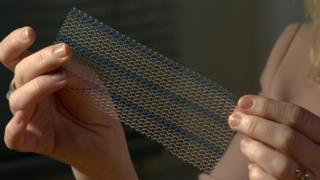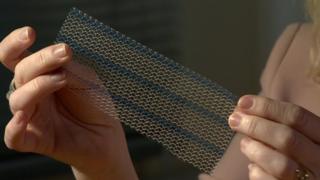Complete vaginal-mesh removals ‘leaving material behind’
Dozens of women who thought they were having a “complete mesh removal” are said to be affected. …


Dozens of women who thought they were having a “complete mesh removal” have discovered material has been left behind, the BBC’s Victoria Derbyshire programme has been told.
Some women have been left unable to walk, work or have sex after having the initial vaginal-mesh implants.
Specialist surgeons say in some cases total or partial mesh removal can be beneficial.
But some women said their symptoms had become worse. One was left suicidal.
Vaginal-mesh implants remain available on the NHS in England but only when certain conditions are met. In Scotland, the use of mesh was halted in 2018.
‘Chronic pain’
“Leila”, not her real name, said her surgeon had promised her a “full mesh removal” – but she has now been told more than 10cm (4in) could have been left behind.
She had mesh implanted several years ago to treat urinary incontinence and said she had woken after the surgery with “chronic pain in my legs, my groin and my hips”.
It is believed she suffered nerve damage.
A year later – after being told by one expert a mesh removal would be unlikely to resolve her pain – she found a surgeon who told her the implant could be completely removed.
‘Family rejoiced’
“The first question I asked was, ‘Can this mesh be removed fully?’ and I was assured it was possible,” she said.
She had two operations – each taking her half a year to recover from – and was told there had been a full removal.
“Me and my family rejoiced, thinking that chapter of several years of my life was going to be over,” she said.
But “within a few months” the pain began to return and her health deteriorated.
‘Upside down’
She sought a scan and said she could not describe the “horror” of being told only 5-8cm had been removed.
“My whole world turned upside down,” she said, breaking into tears.
She has since been told by a separate specialist her form of mesh was one of the most difficult to remove and could cause significant nerve damage if not removed properly.
She said she had never been told this by her surgeon.
The number of women affected is unknown but the Victoria Derbyshire programme understands there are at least dozens of such cases.
Over 20 years, more than 100,000 women across the UK have had transvaginal mesh implants to treat organ prolapse and incontinence – often after childbirth.
Mesh removal is extremely complicated. One surgeon has compared the removal of an implant from the pelvis to removing hair from chewing gum.
There can also be some confusion over terminology.
‘Surgeon’s responsibility’
Baroness Cumberledge, who is leading a governmental review into vaginal mesh, said in some instances, for example, a partial removal was referred to by surgical teams as a “full vaginal removal”.
And, she told BBC News, it was “the surgeon’s responsibility” to ensure the patient was clear what the surgery entailed.
Now, Labour MSP Neil Findlay has written to Scotland’s First Minister, Nicola Sturgeon, calling on her to ask the General Medical Council to investigate.
He told BBC News he had seen evidence of several instances in which women had been told by surgeons they would receive a “full” or “complete” removal, but where material had been left behind.
‘Brick wall’
Another woman, “Fiona”, said she had been left suicidal after her complications had reappeared following her mesh-removal surgery, for which she had paid £12,000.
The issue, she said, had been exacerbated by a letter sent from her surgeon to her GP, saying a complete removal had taken place.
This had meant when she had asked to be referred to a specialist, she had hit a “brick wall” and could get a second opinion by self-referring only.
When she did, she was told some of the implant remained.
“You feel betrayed all over again,” she said.
‘Best decision’
Surgeons say most of the fee to receive private care for mesh removal comes from hospital costs.
The Royal College of Obstetricians and Gynaecologists said in a statement that it took “each and every complication caused by mesh very seriously”.
It said: “Management of symptoms will depend on the complication and total or partial removal of the mesh may be recommended in some circumstances.
“Whereas for other women, mesh removal may not be the solution to the problem.
“Women must be informed of all options available and the benefits and risks of each so they can make the best decision about their care.”
Follow the BBC’s Victoria Derbyshire programme on Facebook and Twitter – and see more of our stories here.

